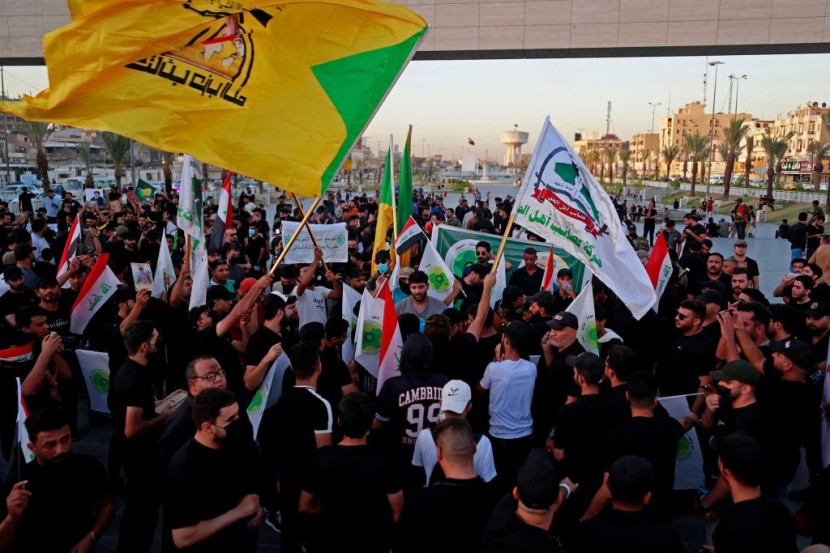
Hundreds of demonstrators assaulted the Swedish embassy's main gates in Baghdad's Iraqi capital in retaliation for police in Stockholm authorizing another planned Koran burning.
Social media videos depicted many demonstrators within the Swedish embassy's perimeter, as well as black smoke and flames emanating from the structure. Security forces armed with electrified batons pursued protestors and used water cannons to disperse them and extinguish the fire.
Iraq Expels Swedish Envoy Over Planned Koran Burning
Eyewitnesses told CNN that the demonstrators withdrew from the Swedish Embassy's perimeter after setting part of it on fire "after conveying their protest message against the act of burning the Holy Book of God."
According to multiple organizations, several correspondents covering the protests were detained by security forces, and at least one was assaulted.
Ziyad Al-Ajili, the director of the Journalistic Freedoms Observatory (JFO) in Iraq, told CNN that three photojournalists working for international news agencies were detained. At the same time, security forces assaulted a fourth, destroying his camera.
The scheduled demonstration in Sweden occurred Thursday evening in front of the Iraqi embassy in Stockholm. Salwan Momika, an Iraqi national living in Sweden, coordinated the event. Monika burned a copy of the Koran outside a mosque in Stockholm during the Muslim holiday of Eid al-Adha last month, sparking outrage in Iraq and around the globe.
According to videos, no Korans were torched during Thursday's protest. Still, footage showed two demonstrators kicking and partially destroying a Koran and Momika stepping on a Koran and polishing his shoes with an image of the Iraqi flag.
A spokesperson for the Stockholm police stated that two individuals with permits were present at the protest and that an additional 150 people were present, most of whom were journalists.
Iraq-Sweden Ties in Turmoil
The Iraqi government stated that Baghdad had also recalled its charge d'affaires in Sweden, and Iraq's official news agency reported that Iraq had suspended Ericsson's work authorization on Iraqi soil. Anti-Islam protesters, one of whom is an Iraqi immigrant to Sweden who torched the Koran in front of a Stockholm mosque in June, received permission from Swedish police to burn the Koran in front of the Iraqi embassy on Thursday.
In the end, the protesters kicked and partially destroyed a volume they claimed to be the Koran, but they departed the area without setting it on fire after an hour. Muslims believe that the Koran, the fundamental religious text of Islam, is a divine revelation.
Tobias Billstrom, the Swedish foreign minister, stated that Baghdad embassy personnel were secure but Iraqi authorities had failed to protect the embassy. Iran's foreign ministry recalled Sweden's ambassador in Tehran late on Thursday to "strongly protest against the desecration of the sacred Koran," state media reported, while Turkey referred to the events in Stockholm as a "despicable attack."
A spokesperson for the Swedish foreign ministry verified that the ambassador was summoned due to the recent events in Stockholm but declined to comment on what was discussed during the meeting.
Sayyed Hassan Nasrallah, the leader of Lebanon's potent armed group Hezbollah, urged Arab and Islamic nations to follow Iraq to expel Sweden's ambassadors and withdraw their envoys from Sweden. According to a statement released by the office of Iraqi Prime Minister Mohammed Shia Al-Sudani, the Iraqi government condemned the attack on the embassy and pledged to defend diplomatic missions.
The decision to recall the charge d'affaires was made during the protest in Stockholm but before the demonstrators' departure without burning the Koran. Billstrom stated that the assault on the embassy was "completely reprehensible, and the government condemns these atrocities with the utmost severity." He added, "The government is in contact with Iraqi officials to convey our dismay."
The State Department in Washington condemned the assault on the embassy and criticized Iraqi security forces for failing to prevent demonstrators from entering the diplomatic post. The European Union hoped Iraq would "quickly adopt the necessary security measures" to prevent future incidents. Several videos posted to the Telegram group One Baghdad depicted protesters assembling near the Swedish embassy at 1 a.m. on Thursday, chanting pro-Sadr slogans, and then assaulting the embassy about an hour later.
Videos subsequently depicted smoke ascending from a building in the embassy complex and demonstrators standing on the roof of that building. Reuters witnesses reported that by dawn on Thursday, security forces had been deployed inside the embassy and smoke was rising from the structure as firefighters extinguished obstinate embers.
In recent years, several Korans have been burned in Sweden, primarily by far-right and anti-Muslim activists. Burnings in Sweden prompted clashes between police and Muslim demonstrators. The Muslim world was outraged by the burnings. The Swedish security services stated that such actions reduce national security. Earlier this year, the police rejected some applications for protests that included burning Korans, citing security concerns.
However, the courts have overturned those decisions, stating that Sweden's expansive free speech laws protect such acts. The constitution protects the freedom of speech laws and cannot be changed easily; however, the government has stated that it is contemplating legal changes that would allow police to halt public burnings if they threaten Sweden's security.
The fires further complicated Sweden's efforts to join NATO. While Turkey has stated that it will ratify Sweden's application this month, previous burnings have enraged President Recep Tayyip Erdogan. Prime Minister of Sweden Ulf Kristersson has criticized the burnings, stating that although they are lawful, they are inappropriate.
Turkey's foreign ministry firmly condemned Thursday's "despicable assault" on a Koran in Stockholm and urged Sweden to take "decisive measures" to prevent future acts of Islamophobia. The Swedish foreign ministry had no immediate comment regarding Ankara's response.
Related Article: Kenya Protests: 6 Dead After Police Open Fire to Protestors; Cops Told Not To Report Casualties
© 2025 HNGN, All rights reserved. Do not reproduce without permission.








